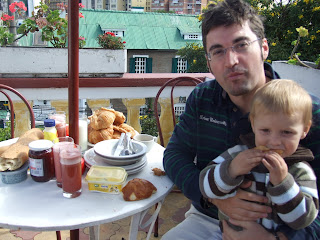 I would like to introduce you all to Rosa. She is a really marvellous woman. The place we are staying in (I am not going to advertise it) has eight apartments and nine additional rooms. Rosa is responsible for cleaning them all every day. She arrives at seven each morning and rarely leaves before six, with only one day off a week. Her bus journey to work takes over an hour each way. Money is tight. She earns less than a dollar an hour.
I would like to introduce you all to Rosa. She is a really marvellous woman. The place we are staying in (I am not going to advertise it) has eight apartments and nine additional rooms. Rosa is responsible for cleaning them all every day. She arrives at seven each morning and rarely leaves before six, with only one day off a week. Her bus journey to work takes over an hour each way. Money is tight. She earns less than a dollar an hour. Rosa's life is not easy. She is supporting two adult children through university without any additional help. She left behind her family and friends in her home town of Cuenca five years ago in order to come to Quito for the sake of her children. In this way at least, she is typical of many Ecuadorian parents who have not had many opportunites in life and are now willing to sacrifice everything in order to give their children an education.
She works such long hours that it has been difficult to find friends in the capital. She gets up at five in the morning to prepare breakfast, gets home after seven and is usually in bed by nine.
Despite her long hours and the physical nature of her job Rosa is always smiling and only admits to tiredness when asked directly. She is a very intelligent women who has studied philosophy and has an interest in history and geography. She is also an excellent cook. Yet she spends most of her day on her hands and knees washing floors and cleaning other peoples' toilets.
She dreams about travelling and about starting her own business, but she adds that she daren't have too many ambitions or else she will go mad. With only two weeks holiday a year and no way of saving money, both foreign holidays and business ventures remain distant dreams.
I cannot express how much respect I have for this lady. She has brought a ray of sunshine into our lives and taught us a thing or two about gratitude. I have asked her to tell me the secret of her happiness. Her reply is this:
"I am happy because God has been good to me. I have my health and I have a job. I am often tired and money is tight but I don't need material things. This job allows me to see my children progress in life. I live for them."
It must be frustrating for her to work in these conditions for such little pay, expecially given her intelligence and interest in the world, but despite this fact she never complains.
When we visited her home Rosa prepared us a magnificent meal and thanked us for "making the sacrifice of travelling across town to her home."

Rosa is able to see the positive in everything. She does not have much, but she is grateful for what she has got and would share her last dollar with someone who needed it. Above all I hope that the next time someone in our family is having a "bad day" back in Finland we are able to think back to Rosa and put things in perspective. With more people like Rosa around the world would be a better place.
I have no idea whether anyone is actually reading this blog..but I showed Rosa this posting and she was very excited at the thought that her picture and story would be visible to people in other countries. If you have read this I hope her positive attitude will inspire you just a little!


























